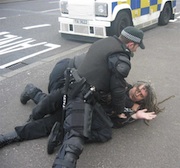
The British government has been forced to reconsider stop-and-search powers following a European Court of Human Rights (ECHR) ruling that the power to search people without suspicion - under Section 44 of Britain’s ‘Terrorism Act 2000’ - is illegal.
The move follows a recent European Court of Human Rights (ECHR) ruling that the power to search people without suspicion - under Section 44 of Britain’s Terrorism Act 2000 - was illegal.
“I will not allow the continued use of Section 44 in contravention of the European Court’s ruling and, more importantly, in contravention of our civil liberties,” Conservative Home Secretary Theresa May told parliament today.
However, May left open the possibility that the powers could continue to be used against “suspected terrorists”. It is thought the exception could still allow the PSNI police to target the broad nationalist community in the north of Ireland.
May said she was introducing a new ‘suspicion threshold’ which would limit the use of stop-and-search powers in the future. She said Section 44 would still be used in relation to the search of vehicles, while the related Section 43 could be used against individuals.
Last week, the ECHR rejected the British government’s final appeal over the continued use of Section 44 and called for their use to be ended immediately.
In January of this year, the court ruled that it violated the right to respect for private life guaranteed by Article 8 of the Convention on Human Rights.
Although the British government requested that the case be referred to the Grand Chamber of the Court, that was refused, making the January judgment final.
“The draconian power to stop and search without suspicion is clearly wrong in terms of European rights’ law,” said Breandan Mac Cionnaith.
“That Section 44 powers have been used in the Six Counties on over 28,000 occasions in the 12 months between April 1 2009 and March 31 this year should be a matter of serious alarm and major disquiet to all those concerned with the protection of human and civil rights,” he said.
“This is particularly true when one considers that, between January 1 and March 31 this year, the PSNI made use of powers under Section 44 on at least 8,200 occasions. The majority of that usage occurred during the three month period after the European Court of Human Rights [ECtHR] had issued their landmark judgment in early January.
“That fact alone demonstrates the contempt which both the PSNI and Six County Policing Board have for human rights in the Six Counties.
“At the time of the original judgment, eirigi was one of the very few organisations prepared to publicly call for the ECHR ruling to be made immediately applicable to the Six Counties. We also said that the ECHR ruling was extremely pertinent for the Six Counties where there already had been a dramatic rise in the use of repressive stop and search powers under Section 44.”
Speaking before today’s announcement, Mr MacCionnaith warned that “a fig-leaf” might be used “by the British government, the establishment parties at Stormont, or from David Ford as so-called justice minister” in regard to the “repressive legislation which the ECHR has consistently ruled to be illegal”.
“This latest European Court decision exposes the illegal and arbitrary reality of British policing in the Six Counties. It is a reality far removed from that promised by those nationalist parties who continue to endorse the PSNI.
Mr MacCionnaith urged all persons subjected to stop and search by the PSNI under Section 44 to immediately contact a solicitor with a view to challenging the legality of their detention and search.
However, Sinn Fein insisted the uses of Section 44 powers had now “effectively ended”.
“The high proportion of the use of Section 44 powers caused clear concern amongst a wider range of sectors,” said the party’s member of the Policing Board, Alex Maskey.
“I welcome the fact that this power has now been effectively brought to an end and that we can work to ensure the PSNI carries out their responsibilities in an open and transparent way.”
DONNELLY TARGETED
A prominent republican is considering legal action after he was stopped and searched under section 44 this week.
The Derry man, a leading member of the 32 County Sovereignty Movement, was released from prison just over a week ago after serving a strongly disputed seven-month sentence for assaulting a police officer.
Donnelly himself suffered a broken arm during the arrest operation.
“[The PSNI] said they wanted my phone and when I asked them what they wanted they grabbed me, twisted my arms and took the phone,” he said.
Donnelly later learned that police searched his parents’ Creggan home at the same time and took away mobile phones.
When Donnelly’s brother arrived the PSNI also seized his mobile phone.
His father, Roy, said the PSNI spent two hours in the house after locking him and his wife inside.
“lt’s 15 years since my house was searched. I am not political and my wile is not political,” he said.
![[Irish Republican News]](https://republican-news.org/graphics/title_gifs/rn.gif)
![[Irish Republican News]](https://republican-news.org/graphics/title_gifs/harp.gif)

